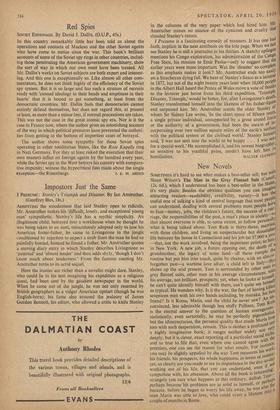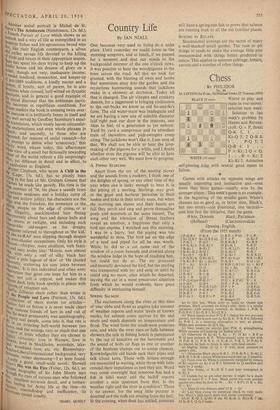SOMETIMES it's hard to see what makes a best-seller sell;
but v"111 Sloan Wilson's The Man in the Grey Flannel Suit (Cassell, 12s. 6d.), which I understand has been a best-seller in the States' it's very plain; Besides the obvious qualities you can imagine attracting readers—readability, credibility, variety—it has the useful one of talking a kind of central language that most people can understand, dealing with central problems most people hev: to face—money, jobs, the children's future, the success of a mar riage, the responsibilities of the past, a man's place in society—le that almost everyone is able, to some extent, to follow personally what is being talked about. Tom Rath is thirty-three, nnarlIe'l with three children, and living an unspectacular but dissatisfied life between his house in Connecticut and his job (at $7,000 a Year, —that, not the work involved, being the important point, to bun' in New York. A new job, a future opening out, the death Itifi.a grandmother, the legacy of some land—all these rumple t"te. routine but put him into touch, quite by chance, with an t forgotten past—a wartime love affair, a child left in Italy---111% shows up the arid present. Tom is surrounded by other men.,Ih grey flannel suits, other men in his average circumstances, his average, not brilliant, prospects; yet, when he looks at him self if he can't quite identify himself with them, can't quite see bille l eed ki b as typical. He wonders why. Is it the war, the fact of having st seventeen men with his own hands including, by mistake, his - friend? Is it Rome, Maria, and the child he never saw? An nuth convinced, less admirable though less stuffy Pulham, Tom Its. is the eternal answer to the question of human averageness: statistical) even sartorially, he may be perfectly pigerinhcm% but the idiosyncracies, the personal quality that made Maria invor him with such desperation, remain. This is neither a profound "ry a highly imaginative book; it ranges neither widely nor .vehep deeply; but it is clever, exact reporting of a particular social nIct"he and so true to life that, even where one cannot agree with premises, one can see the reason for what results. For instani;„ you may be slightly appalled by the way Tom measures his weey; his friends, his prospects, his whole happiness, in terms of m° day yet, so clearly are you made to see its importance in the day-104:;4 working out of his life, that you can understand, even if sympathise with, his obsession. Above all the book is interesting strangely you care what happens to this ordinary, dullish TOI11_, perhaps because his problems are as solid as himself, or perrPle because, before he began to worry his life away, he was alson man Maria was able to love, who could cram a lifetime into couple of months in Rome. SPECTATOR, APRIL 20, 1956 Another social portrait is Michel de St. rierre's The Aristocrats (Hutchinson, 12s. 6d.), 4 French Pursuit of Love which shows us an outlook and a way of life as exemplified in an eentric father and his uroariousbrood who live like their English copunterpartbs,r a silvan cud rather savage life devoted to the killing, or birds and beasts in their appropriate season. fli4na has spent his days trying to keep up the ;111,ilY house and his dreams of glory on ha ;liner, though not very, inadequate income; 'model landlord, monarchist, and keeper-up Pre-1889 traditions, a kindly master and a 11Illan, if bristly, sort of parent, he is also `I'nelous when crossed, half-Witted on dynastic (1,
,4estions, and in general a good example of
social dinosaur that the nobleman inevit- lio!Y becomes in republican conditions. For latish readers the book is amusing twice over: ,t8E because it is eY brilliantly funny in itself and Well served by Geoffrey Sainsbury's excel- ,,111 translation, which wisely leaves untranslat- le exclamations and even whole phrases in ',Lend); and secondly, to those who are l','rested, for reasons of social research—for \nis attempt to define what 'aristocracy,' that Slide view of a small but fictionally rewarding eller of the world reflects a life surprisingly it4s, yet different in detail and in effect, to ,‘.equivlent in England. Al`valter Clapham, who wrote A Chill in the ' (Cape, 13s, 6d.), has so plainly been 4418 at the feet of Mr. Graham Greene that times he reads like parody. His time is the :,°k summer of '54; his 1place a seaside town ,,'..suitable seediness and a holiday camp of d and hollow jollity; his characters are the a g Y and the forsaken, the immature or the le,Ing, people on the edge of crime, or at z'!'t illegality, mackintoshed bats flitting CrlYmously about bars and dance halls and Q`q streets at twilight, and. including such d!ene-like old-stagers as the dreamy 4'llnquent referred to throughout as 'the kid,' itnid the ex-RAF man slipping through despair ever-shadier occupations. Only his style is Orent—chirpier, more ebullient, with fanci- 6].ind easy asides like: 'Morrie, now almost krtu, With only a reef of silky black hair pilund a pale lagoon of skin' or 'He chatted ci,trteseatntisY.: scattering his easy jokes between 411,i!erervit is this individual and often witty
that gives one hope for him as a
, ation not just a copyist, and makes this ,005 dank little book sparkle in places with 's,lenn of reluctant sun.
Zilliacus chats rather than writes in
Six People and Love (Putnam, 13s. 6d.), collection of short stories (or articles- 41)olher fact or fiction it is never made clear) 1(\i`411 various friends of hers in and out of 80 much presumably true autobiography, leitM,anY real people, come into it, that one is ke,i in an irritating half-world between two \olit`;.'', and the settings vary so much that pne ds„,,(Iers at times whether they are chosen to qeviinlY virtuosity: love in Warsaw, love in IIdeva, love in. Stockholm, mountain, lake- heri_. woodland love, etc. etc. Bloomsbury- 44trentie,s-Liberal-international background, very : rather depressing—I at least found. s,tlY a good, small-scale novel : Showell obiie,4„s His was the Fire (Faber, Its. 6d.), an hi:-ine biography of Sir Jahn Moore seen 11(1:118b the eyes of various men who followed duus excellent accurate detail, and a or tremen- eeling for Army life at the time—its r1e. ,.n, comraeship ty.and inefficiency, its Ious casual dCruel
ISABEL QUIGLY



















































 Previous page
Previous page